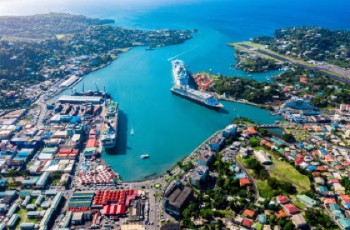CASTRIES, St. Lucia – St. Lucia's government has defended its decision to sign a Memorandum of Understanding (MoU)with the United Kingdom-based Global Ports Holding Plc (GPH), insisting that the two ports here have not been sold and would remain as “national public assets”.
 St. Lucia’s Port Castries (File Photo)GPH, which describes itself as the world’s largest independent cruise port operator, said following bilateral discussions, it has signed a MoU with the St. Lucia government for a 30-year concession, with a potential 10-year extension option for the cruise related operations here.
St. Lucia’s Port Castries (File Photo)GPH, which describes itself as the world’s largest independent cruise port operator, said following bilateral discussions, it has signed a MoU with the St. Lucia government for a 30-year concession, with a potential 10-year extension option for the cruise related operations here.
In a nationwide radio and television broadcast on Sunday night, Prime Minister Phillip J Pierre said that GHP “will soon start work on the redevelopment and modernisation of the Cruise Infrastructure of Port Castries and the Soufriere Waterfront on a 30-year concessionary agreement.
“The two ports have not been sold and remain national public assets owned by the Government of St. Lucia. The truth is that, on average 10 per cent of St. Lucia Air and Sea Ports Authority’s (SLASPA) revenue is generated directly from cruise ship operations and it is this 10 per cent that will fund the development on a revenue-sharing agreement,” Pierre said.
He told the nation that the cargo operations will continue to account for 90 per cent of SLASPA’s revenue and this will remain with SLASPA.
“SLASPA’s cruise-related debt of approximately US$20 million will be paid by GPH,” Pierre also announced.
In August last year, Opposition Leader Allen Chastanet expressed his intention to revise existing legislation concerning public contracts and agreements between the government and investors if his administration regains governance.
He said that the government had not been transparent regarding the MoU signed with the GPH, criticising the Pierre administration for hastily finalising the deal and raising concerns about undisclosed hidden motives.
“I absolutely would change the law that on signing any contract, we must make it public,” Chastanet said, even as he acknowledged the importance of confidentiality agreements during the initial negotiation stages.
The former prime minister had also questioned reports that GPH would receive loans from the Bank of St. Lucia, in which ther government holds a majority share, for the revitalisation of the ports.
“We understand that the GPH deal has now obtained approval for a loan from the Bank of St. Lucia to undertake the project. Our understanding is that there may be a syndicated loan, but for certain, that the Bank of Saint Lucia will be lending money to GPH for its investment in St. Lucia,” said Chastanet..
“This deal potentially means that GPH can earn upwards of 400 million US dollars over the 40-year period. All we’ve been told is that GPH is going to be now investing $40 million. So we think that there’s something clearly one-sided with that deal and it begs the question, why would the government undertake such a deal because whatever expansion they wanted to do, they could have done and financed themselves because the revenue stream was already there.”
However, Tourism and Investment Minister, Dr. Ernest Hilaire, dismissed Chastanet’s concerns, saying “when investors overseas hear that there is in St. Lucia, elements that do not think investors should get any financing in St. Lucia, it will decrease confidence in ourselves as an investment destination”.
GPH said that under the terms of the MoU, both parties have entered into an exclusive period. “During this period, GPH and the Government of St Lucia will continue to carry out extensive due diligence, and both parties will work towards successfully signing the concession agreement.
“Following the successful execution of the concession agreement, GPH will use its global expertise and operating model to manage the cruise port operations in St Lucia. In addition, GPH will invest in a material upgrade of the cruise port facilities,” the UK-based company added.


